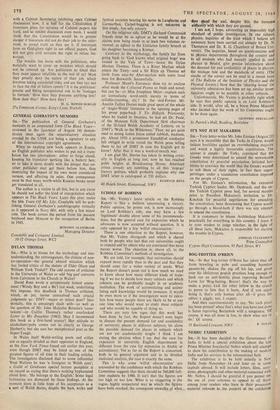DYLAN THOMAS
SIR,—Who is to blame for the mythology and mis- understanding, the extravagances, the climate of non-
co-operation—the general absurd situation which has fooled critics of the stature of Elder Olson and William York Tindall? The odd canons of criticism in the University of Wales or odd `big gun' converts from Calvinism to the Church in Wales?
David Rees wrote a scrupulously honest assess- ment ('Windy Boy and a Bit') last week, underlining this impasse, this deadlock in Thomas criticism, which, as yet, leaves unresolved such crucial judgments as: DMT—major or minor poet? Inci- dentally, this is amusingly dealt with—as well as the question of Mr. John Malcolm Brinnin's 'anno- tations'—in Caitlin Thomas's rather overlooked Letter to My Daughter (1963). May I recommend this book as a first-hand source? Her attitude to alcoholism/pubs comes out as clearly as George Herbert's; but she sees her metaphysical poet as the Super-Tough.
In Wales itself Welsh-writing poets and critics are as equally divided as their opposites in England, as the New York Times found out earlier this year, even though DMT may be listed as one of the greatest figures of all time in their leading articles. The investigation disclosed that to some influential West Walians he was 'a foreigner in Welsh eyes'; a Guild of Graduates special lecture pamphlet is on record as saying that there's nothing hyphenated about him: 'He belongs to the English.' Some legal luminaries are dismayed by these findings. At the moment there is little hope of his acceptance as a a sort of Welsh Burns, despite the bars, walks and festival societies bearing his name in Laugharne and Carmarthen. Carpet-bagging is not unknown in this windy, fox-wily estuary.
On the religious side, DWI% die-hard Communist friends must be as aghast as he would be at the claims now being made in at least two volumes re- viewed; as aghast as the Unitarian family branch at his daughter becoming a Roman.
Contrary to the mythology, the family far from going back to 'God knows what original bogs' was rooted in the Vale of Towy—hence the Dylan Marlais Thomas. There is a River 'Marais which enters the Towy—and a Sir Rhys ap Thomas set forth from near-by Aber-marlais with some local men for. Bosworth. Successfully.
Professor Maud's Entrances does try to analyse what made the Collected Poems so fresh and novel; but can he—or Miss Josephine Miles—explain such an iconoclastic word-smith merely in terms of syllable-counting, etc.? In the mid-Forties Mr.
• Aneirin Talfan Dayies made great sport of the whole of 'Anglo-Welsh' literature in the opening pages of his prose paperback. Y Tir Digaith. Previously, when he traded in Swansea, he had set Dr. Peate, , of the Museum Folk Department (first chairman of the ill-fated Welsh Academy of Letters), on to DMT's `Walk in the Wilderness.' Then, we got quite used to seeing James Joyce called rubbish, madness, etc. About 1950 a prominent Eisteddfod conductor felt obliged to write round the Welsh press telling them to lay off DMT in case the English got to know! After that it was a word-of-mouth war.
I am glad Mr. Davies has taken to writing critic- ally in English at long last, now he has reached giddy heights at Broadcasting House. American critics already are tumbling to all this `stop-go' literary politics, which probably explains why one DMT letter is catalogued at 550 dollars.
KEIDRYCH RHYS


































 Previous page
Previous page